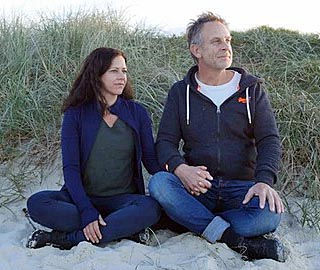Considering Professor Jem Bendell in the Time of Dying
- Dr Wendy Sarkissian, PhD

- Apr 6, 2024
- 4 min read
I’ve been eager to learn more about the work of Jem Bendell since I watched him in Australian Michael Shaw’s provocative film, “Living in the Time of Dying” (https://www.livinginthetimeofdying.com/).

Living in the Time of Dying is an unflinching look at what it means to live amid climate catastrophe and find purpose and meaning within it. Recognizing the magnitude of the climate crisis we are facing, independent Australian filmmaker Michael Shaw travels around the world looking for answers. We soon begin to see how deep the predicament goes along with the systems and ways of thinking that brought us here. Stan Rushworth, a Native American Elder, brings an especially enlightening viewpoint to these questions. It becomes clear that climate breakdown is going to ruin our way of life. And this opens up a whole new set of questions:
How did we get here?
How do we choose to live, and what actions make sense at this time?
The people interviewed in the documentary, all highly regarded and well-known spokespeople on the issue, argue it’s too late to stop catastrophic climate breakdown but never too late to regain a renewed life-giving relationship with our world.

Jem Bendell's work is at the core of Michael Shaw’s powerful film.
Bendell’s work deserves our full attention.
In his efforts to challenge mainstream narratives on climate breakdown and advocate for deeper introspection within the scientific community, Professor Jem Bendell faces opposition from what he calls “climate users,” professionals who leverage climate issues for career advancement. This opposition likely stems from resistance to his critiques of institutional biases and calls for more urgent action to address the climate crisis.
Professor Jem Bendell’s critique is regarded as viable by some individuals and groups within the climate science community who share his concerns about the limitations of mainstream climatology and the need for more comprehensive and urgent action to address the climate crisis. However, his views may face skepticism or opposition from others who adhere more closely to mainstream scientific perspectives or who are invested in maintaining the status quo.
While some may consider his views unconventional or provocative, Bendell is a respected academic who has contributed significantly to climate adaptation and resilience discussions. Bendell’s views on climate breakdown, particularly his emphasis on the urgency of action and his critique of mainstream climatology, are not universally aligned with all aspects of modern scientific findings. While Bendell’s concerns about the severity of climate breakdown impacts and the need for deeper introspection within the scientific community resonate with some researchers and activists, there may be differing interpretations of specific scientific data or projections within the broader scientific community.
The failure of mainstream climatology
Professor Jem Bendell’s message is that mainstream climatology has significantly underestimated the severity and urgency of climate breakdown, advocating for a deeper examination of institutional biases and the need for more comprehensive and urgent action to address the crisis. He challenges the notion of gradual or technological solutions, urging for a broader societal adaptation and resilience effort to confront the existential threat of climate breakdown.
Bendell’s views are sometimes often characterized as a doomsday perspective because he emphasizes the severity of climate breakdown impacts and the potential for societal disruption and collapse if urgent action is not taken to address the crisis. His critique suggests that mainstream approaches have failed to adequately acknowledge the gravity of the situation, leading to a sense of impending catastrophe if significant changes are not made.
Three significant changes
Bendell recommends three significant changes in response to the climate crisis:
Ditching Incremental Tactics: He advocates for bolder measures to curb and draw down emissions, recognizing that incremental approaches may not be sufficient given the situation’s urgency.
Exploring Geoengineering: Bendell suggests exploring the potential for safe, effective, and cost-effective forms of geoengineering to mitigate climate impacts.
Adapting for Dramatic Changes: Bendell emphasizes the importance of adapting to dramatic changes and even potential breakdowns of systems through transformative and deep adaptation strategies, which encompass psychological, monetary, and societal adjustments to address the challenges posed by climate breakdown.
Deep adaptation refers to a framework proposed by Bendell that emphasizes preparing for and adapting to the profound changes and potential collapse of societal systems because of climate breakdown. It involves recognizing the severity and irreversibility of climate impacts and making fundamental shifts in how societies operate to increase resilience and sustainability. Deep adaptation encompasses various dimensions:
Psychological Adaptation: Recognizing and processing the emotional and psychological impacts of climate breakdown, such as grief, anxiety, and existential dread, and fostering resilience and coping mechanisms to navigate these challenges.
Societal Adaptation: Implementing structural and systemic changes within societies to address vulnerabilities and enhance resilience to climate-related disruptions, such as changes in governance, economic systems, and social norms.
Cultural Adaptation: Reevaluating cultural values, beliefs, and practices to align with sustainable and regenerative ways of living that prioritize environmental care and community well-being over consumerism and exploitation.
Economic Adaptation: Rethinking economic models and priorities to prioritize sustainability, equity, and well-being over endless growth and consumption, including transitioning to alternative economic paradigms prioritizing local economies, resource conservation, and social equity.
Overall, deep adaptation represents a holistic approach to confronting the existential threat of climate breakdown by acknowledging the need for profound societal transformations across multiple dimensions to foster resilience and sustainability in the face of uncertain and rapidly changing environmental conditions.
I’m eager to learn more about Deep Adaptation. To make it happen in my life. I feel I have been easing into this idea for a very long time! And at 81, I have a long way to go!



Comments